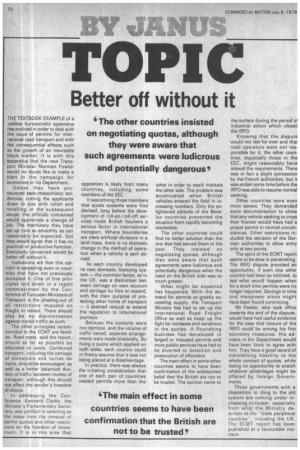T O P I
Page 72

If you've noticed an error in this article please click here to report it so we can fix it.
Better off without it
6 The other countries insisted on negotiating quotas, although they were aware that such agreements were ludicrous and potentially dangerous 9
THE TEXTBOOK EXAMPLE of a useless bureaucratic apparatus has evolved in order to deal with the issue of permits for international road transport and with the consequential effects such as the growth of an inevitable black market. It is with this apparatus that the new Transport Minister Norman Fowler would no doubt like to make a start in the campaign for economies in his Department.
Unless they have pronounced sado-masochistic ten dencies, cutting the applicants down to size with relish and revelling in the subsequent abuse, the officials concerned would appreciate a change of job. The machinery they have set up runs as smoothly as can reasonably be expected, but they would agree that it has no practical or productive function. Everybody concerned would be better off without it.
Indications are that this opinion is spreading even in coun tries that have not previously accepted it. One of five principles laid down in a report commissioned by the Con ference of European Ministers of Transport is the phasing-out of all restrictions imposed on freight in transit. There should also be no discrimination against transit traffic as such.
The other principles recommended to the ECMT are familiar. Road costs, said the report, should as far as possible be allocated to users. Combined transport, including the carriage of containers and lorries on trains, should be encouraged, as well as a better balanced division of traffic between modes of transport, although this should not affect the sender's freedom of choice.
In addressing the Conference, Kenneth Clarke, the Minister's Parliamentary Secretary, was justified in selecting as the major item the removal of permit quotas and other restrictions on the freedom of movement. It is in this area that opposition is likely from many countries, including some members of the EEC.
It was among those members that quota systems were first devised, long before the development of roll-on/roll-off services made British hauliers a serious factor in international transport. Where boundaries are mere.artificial divisions in a land mass, there is no dramatic change in the method of operation when a vehicle is sent abroad.
As each country developed its own domestic licensing system — the common factor, as in the UK, was a distinction between carriage on own account and carriage for hire or reward, with the main purpose of protecting other forms of transport — it seemed natural to extend the regulation to international journeys: Because the systems were not identical, and the volume of traffic varied, separate arrangements were made bilaterally. By fixing a quote which applied on both sides, each country could in theory assume that it was not being placed at a disadvantage. In practice, there was always the irritating consideration that one of each pair of countries needed permits more than the other in order to reach markets the other side. The problem was accentuated when British vehicles entered the field in increasing numbers. Only the enlightened attitude of the Benelux countries prevented the situation from rapidly becoming intolerable.
The other countries could find no better solution than the one that had served them in the past. They insisted on negotiating quotas, although they were aware that such agreements were ludicrous and potentially dangerous when the need on the British side was so much greater.
What might be expected has happened. With the demand for permits so greatly exceeding supply, the Transport Ministry has had to set up the International Road Freight Office as well as keep up the fight for increases and variations in the quotas. A flourishing business has developed in forged or misused permits and more public services have had to be diverted to detection and prosecution of offenders.
The main effect in some other countries seems to have been confirmation of the widespread belief that the British are not to be trusted. The opinion came to the surface during the period oi industrial action which closed the IRFO.
Knowing that the dispute would not last for ever and that road operators were not responsible for it, the other countries, especially those in the EEC, might reasonably have relaxed the requirements. There was in fact a slight concession by the French authorities, but it was ended some time before the IRFO was able to resume normal working.
Other countries were even more severe. They demanded extra documentation to show that any vehicle seeking to cross their frontier would have had a proper permit in normal circumstances. Other restrictions included the decision of the German authorities to allow entry only at two points.
The spirit of the ECMT report seems to be slow in penetrating. The IRFO dispute provided an opportunity, if even one other country had been so inclined, to test what would happen when for a short time permits were no longer required. Savings in time and manpower alone might have been found convincing.
Mr Fowler, who took office towards the end of the dispute, would have had useful evidence for the case that closure of the IRFO could be among his first economy measures. His advisers in the Department would have been likely to agree with him. They have a good record of maintaining hostility to the whole concept of quotas, while losing no opportunity to snatch whatever advantages might be offered by foreign Governments.
Those governments with a disposition to cling to the old system are coming under increasing criticism, especially from what the Ministry describes as the "trade peripheral countries'', including the UK. The ECMT report has been published at a favourable moment.




























































































































